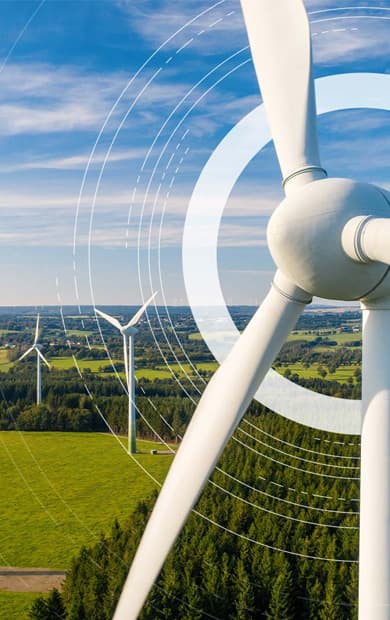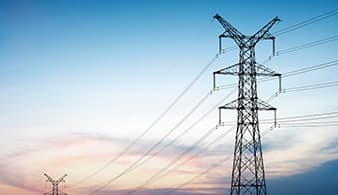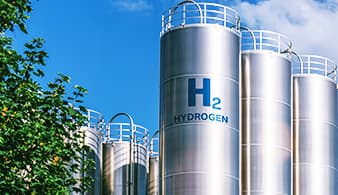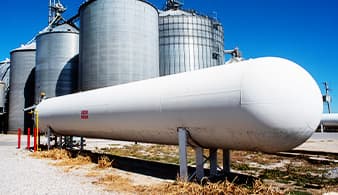Overview
Energy transition offers tough challenges and huge opportunities. Far from affecting only the power sector, all major industries are looking to transform how they produce, store, transport and consume energy. The need for authoritative information on fuels, industrial heat, power and chemical raw materials has never been greater.
Argus is helping companies to understand the landscape of the emerging net zero economy. Our global ecosystem of energy experts provides an industry-grounded understanding of each aspect of how your firm can better navigate the journey to net zero status.
Net zero market coverage
Argus is a leading independent provider of market intelligence to the global energy and commodity markets. Our price assessments and market intelligence are available for all major commodities driving the journey to net zero. Explore our coverage most relevant to your business.
Latest net zero news
Browse the latest market moving news from across key energy transition markets.
Q&A: GravitHy expects policy clarity to shape economics
Q&A: GravitHy expects policy clarity to shape economics
London, 6 February (Argus) — Argus spoke with French direct-reduced iron (DRI) firm GravitHy's chief executive Jose Naldin to explore the company's strategy, cost position and partnership plans in a rapidly shifting competitive landscape. The company is progressing with its Fos-sur-Mer plant, scheduled to begin production in 2030. Edited highlights follow: Some other green steel companies will start with natural gas and gradually introduce H2, mostly because of the price of hydrogen. Does GravitHy plan to use green H2 from the start or have a similar strategy to others? We follow a different approach. While other projects adopt gradual strategies, we are fully committed to energy independence and decarbonisation, and we believe the technology for hydrogen production and its use in DRI is already mature. Our strategy is to start with hydrogen from day one. A key advantage of our site in France is access to baseload electricity, allowing us to produce and use hydrogen on site, which is more cost effective and technically sound. We will still use some natural gas to add carbon to the product, but only for carburisation, and hydrogen will be the reducing agent from the start. This is why we will install significant electrolyser capacity. GravitHy's competitiveness depends heavily on electricity and hydrogen prices in the EU. Which EU policy tools and trade measures support your cost position most? DRI/HBI production has two main costs: energy and cost of capital. Iron ore is a global commodity, so electricity becomes the differentiator. This is why choosing France, with its competitive and decarbonised nuclear-based mix, is essential. But competitiveness also requires a level playing field. Without strong policies ensuring others follow the same decarbonisation rules, European producers are at a disadvantage. Europe must remain committed to the Green Deal and Fit for 55 because decarbonisation is not only about climate, but also about industrial resilience, sovereignty and security. The fundamentals are set out in the Clean Industrial Deal and the Steel and Metals Action Plan. What matters now is implementation. We are waiting for the Industrial Accelerator Act to detail lead market mechanisms and define green steel in a way that incentivises resilient European value chains. North Africa, particularly Algeria, is rapidly scaling low-carbon DRI. Given this growing supply of low cost, hydrogen-ready DRI/HBI in nearby markets, how does GravitHy position itself competitively while producing in a higher cost environment? Competitiveness must be analysed globally and this is where policies matter. Imported material must face the same carbon costs, and safety and quality criteria. Projects outside Europe also face rising cost of capital and natural gas prices. When you add these factors together — plus CBAM payments, transport costs and a strengthened ETS — our projections show that early in the next decade, GravitHy can be competitive against natural gas-based HBI imports. There is confusion because people compare today's HBI prices with future costs for new projects. But the market will change: free allowances will phase out, CBAM becomes financially relevant and carbon prices will likely rise. Under these conditions, our modelling shows competitiveness around 2030. But this depends on EU policy implementation — especially the Industrial Accelerator Act and a strong ETS — to maintain clear decarbonisation incentives. Your current schedule targets commercial production in 2030, with testing beginning in 2029. Is this timeline still valid, given delays at other European decarbonisation projects? For now, yes. As engineering and procurement advance, we will confirm the dates. The timeline depends on permitting and reaching an investment decision, but it remains ambitious and achievable. It will also depend on the progress of our engineering studies and procurement strategy. Europe faces tightness in DR-grade pellet supply. Has GravitHy secured long-term pellets, and how exposed are you to fluctuations? We have already signed a contract with Rio Tinto, one of our shareholders, for high grade pellets covering part of our needs. We are in discussions with other pellet suppliers to complete our strategy. Globally, there is existing pellet capacity and numerous new projects. If all materialise, there could be tightness, but this is a bottom-up situation. For the first wave of DRI projects, supply is sufficient. And if DRI capacity expands significantly, pellet producers will react as it is an attractive market. Mining companies are flexible and investment driven. So I am less concerned than many. Our aim is long-term partnerships across all inputs and we believe our project's value strengthens this position. GravitHy has recently signed an agreement with Marcegaglia, which aligns with Marcegaglia's plan to start electric arc furnace-based flat steel production in Fos around 2028. What does this co-operation entail? Potential supply agreement or infrastructure sharing? These projects are still in development, so the goal is to build strong value chains early. Collaboration is much easier at this stage than after plants are built. GravitHy, Marcegaglia and Nucor are in the same area and there are many potential synergies: logistics, infrastructure, circular economy streams, resource use and environmental co-ordination. If you collaborate too late in heavy industry, it becomes difficult or impossible because of cost and technical constraints. The MoU is not a commercial negotiation, it is about exploring how to make development faster, more efficient, safer and more cost effective through collaboration. Are you exploring partnerships with northern European electric arc furnace/mini-mill projects? No. We remain a small but growing team focused on maximising our project in Fos. We look at northern Europe mainly to understand how we can support their decarbonisation by supplying the iron units they need, rather than forming MoUs similar to the one with Marcegaglia and Nucor. There is only so much we can do with our current size; the focus is on maximising the project in Fos. By Elif Eyuboglu Send comments and request more information at feedback@argusmedia.com Copyright © 2026. Argus Media group . All rights reserved.
Asian, Finnish firms start Sony bioplastic supply chain
Asian, Finnish firms start Sony bioplastic supply chain
Tokyo, 6 February (Argus) — Asian and Finnish companies in chemicals, refining and trading have created a bioplastic supply chain for Japanese electronics maker Sony to cut greenhouse gas (GHG) emissions in electronics production. In the supply chain, Finnish biofuels producer Neste will supply bionaphtha to four petrochemical companies, the companies said on 6 February. The supply chain of multiple companies works like this: Japanese refiner Eneos and South Korean chemicals firm SK Geo Centric will process the bionaphtha supplied by Neste at their crackers to produce bio-paraxylene (bio-PX); this bio-PX will be used by South Korea's Hanwha Impact to make renewable terephthalic acid; that is then converted to renewable polyethylene terephthalate (rPET) resin and films by Japanese firm Toray's South Korean subsidiary Toray Advanced Materials Korea. Eneos has already started supplying the bio-paraxylene produced at its Mizushima refinery in western Japan, the company said. Other companies involved in the supply chain are Japanese refiner Idemitsu which uses bionaphtha at its cracker to produce renewable styrene monomer, which Taiwan's Formosa Chemicals and Fibre (FCFC) converts to renewable polystyrene resin. Another Japanese chemicals firm, Mitsui Chemicals, also uses Neste's bionaphtha to produce bisphenol-A. Japan's Adeka also uses a bio-derived feedstock to make flame retardants, while Chinese firm Qingdao Haier New Material Development produces polycarbonate or acrylonitrile butadiene styrene (ABS) resin. Taiwan-based Chimei also supplies renewable polycarbonate resin. All these biochemical materials will be processed by plastics molding companies for Sony's new products. Using a mass balance approach, biomass-based attributes will be allocated to the products across the supply chain. Japanese trading house Mitsubishi will coordinate the entire chain and manage the delivery of environmental credits. The total volume of bio-naphtha needed for the chain was not disclosed. Using Neste's bionaphtha typically reduces GHG emissions by around 85pc compared with using only conventional fossil-derived naphtha, Mitsubishi said. Sony plans to roll out new audio-visual products made with these renewable plastics globally as it aims to achieve net-zero GHG emissions by 2040. Argus last assessed bionaphtha delivered to northeast Asia at $1,875/t cfr on 6 February, $1,270/t over Japanese fossil naphtha. The range of downstream bio-based products in development continues to expand, but high prices for bionaphtha and downstream biochemicals continue to inhibit wider adoption and commercialisation, according to chemical producers in the region. By Kohei Yamamoto and Lauren Moffitt Supply chain partners Company Role Neste Production of bionaphtha Idemitsu Kosan Production of renewable styrene monomer Formosa Chemicals and Fibre Production of renewable polystyrene resin SK Geo Centric Production of renewable para-xylene Eneos Production of renewable para-xylene Hanwha Impact Production of renewable terephthalic acid Toray Advanced Materials Korea Production of renewable PET resin Mitsui Chemicals Production of renewable bisphenol-A CHIMEI Production of renewable polycarbonate (PC) resin ADEKA Production of renewable flame retardants Qingdao Haier New Material Development Production of renewable PC/ABS resin Sony Design and manufacturing of finished products Send comments and request more information at feedback@argusmedia.com Copyright © 2026. Argus Media group . All rights reserved.
E15 'council' convenes without Dem. lawmakers
E15 'council' convenes without Dem. lawmakers
New York, 5 February (Argus) — A council of Republican lawmakers tasked with negotiating major changes to US fuel policy held its first meeting Tuesday evening, leaving out Democrats that had pushed for a seat at the table. The US House of Representatives last month punted on a proposal that would have allowed year-round sales of gasoline with up to 15pc ethanol (E15) and restricted how many refiners can win hardship exemptions from annual biofuel mandates. Instead, lawmakers tasked a new "rural domestic energy council" with developing policy recommendations by 15 February in the hopes that Congress will weigh legislation by 25 February. The full council met for the first time Tuesday evening, four people familiar with the matter said. The task force includes more than 20 House Republicans with a range of views on biofuel policy, but no Democrats, two of the people said. The office of House speaker Mike Johnson (R-Louisiana), who was in charge of appointing council members, did not respond to Argus' requests for comment. "My Democratic colleagues and I have been clear about the need for Democratic voices on this council — a concern leadership has so far failed to address," representative Nikki Budzinski (D-Illinois) said. "I will continue to press for real, bipartisan action that our growers deserve." Proposals to expand E15 have historically drawn bipartisan support, particularly from Midwestern lawmakers keen to help the region's farmers. Democrats could still support legislation that includes an E15 deal even if left out of negotiations this month. But some lobbyists close to the debate privately doubt that the council will reach any substantial compromise, especially after the earlier E15 proposal drew strong opposition from mid-sized oil refiners that want to maintain their ability to avoid the costly biofuel quotas. The council includes members from states with those refineries, including Gabe Evans' district (R-Colorado), where a Suncor refining complex is located, while CVR Energy and HF Sinclair have units in council co-chair Stephanie Bice's state (R-Oklahoma). Some Republican US senators that have long wanted deeper reforms to the biofuel mandate program are also skeptical of the earlier proposal, complicating any deal's chance of passage. "The federal government should not force Americans to put ethanol in their gas tanks," senator Mike Lee (R-Utah) said. "It is not good for the economy, the environment or car engines. We should not subsidize the corn industry at the expense of hardworking American families." The latest E15 proposal was developed partly by the American Petroleum Institute — an influential lobby within the Republican Party — and has won the support of larger oil refiners like Valero. Farmers' and fuel groups that support the earlier bill have urged the council to focus narrowly on improving it, rather than considering more divisive fuel market issues too. President Donald Trump, who has backed the biofuel industry with a proposal last year for record-high blend mandates, has made clear that he would sign legislation expanding E15 access. He said in an Iowa speech last month that he was optimistic Congress could strike a deal. It is unclear when the council, which includes a number of farm-state biofuel supporters too, plans to meet again. The large majority of gasoline in the US is sold as a 10pc ethanol blend. Farm advocates have pushed for over a decade to loosen summertime smog rules that forbid sales of higher blends in much of the country without emergency waivers . By Cole Martin Send comments and request more information at feedback@argusmedia.com Copyright © 2026. Argus Media group . All rights reserved.
Rotterdam biomarine 2025 sales fall as bio‑LNG surges
Rotterdam biomarine 2025 sales fall as bio‑LNG surges
London, 5 February (Argus) — Marine biodiesel sales fell on the year in Rotterdam in 2025, but bio-LNG and biomethanol made sharp gains while conventional bunker fuels were roughly steady. Marine biodiesel blend sales fell by 16pc to 629,700t in 2025 from 2024, according to data from the Port of Rotterdam. Sales declined by 18pc in the fourth quarter from the third quarter. Data from the Port of Singapore, on the other hand, showed strong growth in blend sales, with marine biodiesel sales higher by 56pc year-on-year in 2025. This was driven by higher uptake of B24, B30 and B100 used to meet FuelEU Maritime requirements, which came into effect in 2025 and require ships coming in, out of, and operating within EU waters to reduce emissions. Rotterdam sales fell due to more competitive pricing east of Suez, pulling demand towards Singapore. B24 Ucome dob Singapore prices averaged $685.71/t in 2025, compared with $797.23/t for B30 Ucome dob ARA. Shipowners bunkering marine biodiesel in Singapore for EU-bound voyages can use it for FuelEU Maritime compliance. Energy used on voyages between EU and EEA ports and non-EU ports has a 50pc share of regulatory coverage, and full coverage for voyages intra-EU. Compliance generated from bunkering marine biodiesel in Singapore can then be used to achieve compliance on vessels operating European routes, via the pooling mechanism, in which obligated companies can combine their compliance balance with other vessels. This has driven an emerging FuelEU compliance surplus market, where participants can buy compliance via pooling to avoid physical bunkering of alternative marine fuels. For use of bio-LNG, over-compliance has sold at a significant premium to cost. As a result, bio-LNG bunker sales in Rotterdam jumped by more than 500pc on the year to 17,650m³ in 2025 on strong demand , and by 1,975pc on the year in the fourth quarter. Biomethanol sales rose by 200pc on the year to 11,800t in 2025, also supported by FuelEU Maritime and an increase in the number of methanol-capable vessels coming into operation — 60 methanol-capable vessels were in operation or on order in 2025, according to DNV data, compared with 17 in 2024. Sales of conventional bunker fuels in Rotterdam in 2025 were largely stable, up by 1pc on the year to 8.73mn t. But ultra-low sulphur fuel oil (ULSFO) sales rose by 16pc on the year, to the highest since 2021, as demand rose to reflect stricter requirements after the Mediterranean was designated an emissions control area (ECA) by the International Maritime Organisation (IMO) in May. Vessels transiting the sea are limited to emitting 0.1pc sulphur. The sulphur emission limits of the ECA in the Mediterranean also contributed to firmer demand for marine gasoil (MGO) and marine diesel oil (MDO). Sales of the products at Rotterdam were up 7pc on the year while fourth quarter sales were unchanged on the year but up by 4pc on the quarter. MGO-based marine biodiesel blends firmed to record highs of 93,200t in 2025, supported by the ECA expansion. But European decarbonisation and regulations — such as EU ETS expansion, FuelEU Maritime, and RED III — made very-low sulphur fuel oil (VLSFO) less attractive for shipowners that are seeking ECA-compliant 0.1pc sulphur fuels such as ULSFO or marine gasoil. VLSFO sales fell by 7pc on the year in 2025 while fourth quarter VLSFO sales were down 8pc on the year but up 17pc quarter on quarter. The increase in scrubber-fitted vessels continued to support sales of high-sulphur fuel oil (HSFO) at Rotterdam, which increased 3pc on the year. HSFO sales at the port in the fourth quarter were up by 3pc on the year but down by 8pc on the quarter. By Hussein Al-Khalisy and Siew Hua Seah. Rotterdam bunker sales t Fuel 2025 2024 y-o-y % 4Q 2025 3Q 2025 q-o-q % 4Q 2024 y-o-y % ULSFO 864,782 748,186 16% 219,039 232,720 -6% 193,567 13% VLSFO 2,850,083 3,076,817 -7% 745,786 635,638 17% 810,831 -8% HSFO 3,420,908 3,330,327 3% 804,962 872,077 -8% 780,437 3% MGO/MDO 1,590,902 1,483,332 7% 402,781 387,173 4% 395,903 2% Conventional total 8,726,675 8,638,662 1% 2,172,568 2,127,608 2% 2,180,738 -0% Biofuels blends 629,706 752,103 -16% 161,934 198,515 -18% 118,201 37% LNG (m³) 992,911 941,366 5% 192,433 331,620 -42% 263,068 -27% Bio-LNG (m³) 17,644 2,775 536% 11,932 960 92% 575 1975% Biomethanol 11,819 3,946 200% na na na 930 na Port of Rotterdam Send comments and request more information at feedback@argusmedia.com Copyright © 2026. Argus Media group . All rights reserved.
Spotlight content
Browse the latest thought leadership produced by our global team of experts covering net zero markets around the globe.
Global Hydrogen Outlook 2026
Podcast - 24/12/25Biomass and REGOs: Policy shifts ahead
Orphan Well Projects: Market Growth, Challenges and Outlook
Explore our net zero products
Whether you’re looking for independent spot price assessments, the latest industry news or long-term market analysis, we have the solutions you need for biofuels, electric power, hydrogen, ammonia, battery materials, biomass and more. Explore our range of our services.
Key price assessments
Argus prices are recognised by the market as trusted and reliable indicators of the real market value. Explore some of our most widely used and relevant price assessments.











